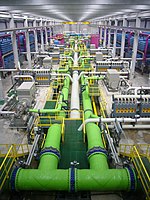
Photo from wikipedia
Abstract The effect of phosphonate-based antiscalant on the precipitation kinetics of gypsum under the hyper-saline solutions relevant to the Red Sea-Dead Sea desalination project was studied. Batch experiments were carried… Click to show full abstract
Abstract The effect of phosphonate-based antiscalant on the precipitation kinetics of gypsum under the hyper-saline solutions relevant to the Red Sea-Dead Sea desalination project was studied. Batch experiments were carried out to determine the effect on the induction times and rates of nucleation and gypsum crystal growth. A wide range of ionic strength (5.5–9 m), pH (6.33–6.91) and oversaturation with respect to the mineral (1.69 ≤ Ωgypsum ≤ 2.11) were covered in the experiments. Induction times in solutions that contained the antiscalant were longer by about 20–500% compared to solutions with a similar composition that did not contain the antiscalant. In the presence of the antiscalant fewer crystals precipitated that were larger in size. The specific surface area of the crystals that precipitated in solutions that contained the antiscalant were smaller in about 20–500% than those that precipitated in solutions that did not contain the antiscalant, and the relative specific surface area was in agreement with the induction time. We conclude that increased interfacial tension in the presence of the antiscalant, retards nucleation and reduces the surface area available for growth. Subsequent rates of crystal growth were impervious to the presence of the antiscalant.
Journal Title: Desalination
Year Published: 2020
Link to full text (if available)
Share on Social Media: Sign Up to like & get
recommendations!